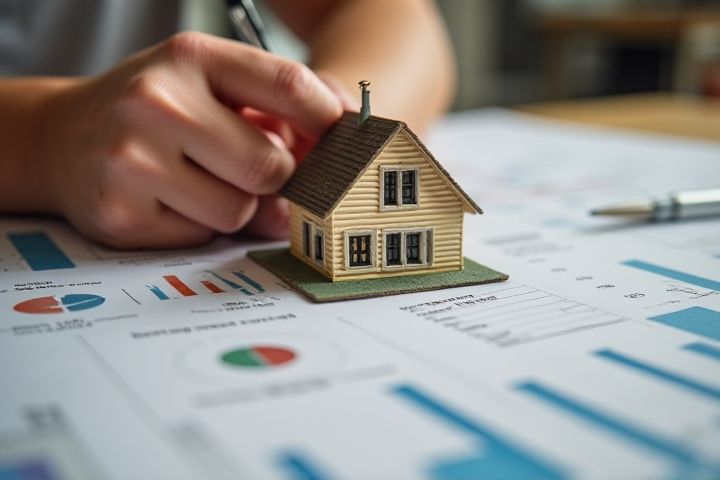
House appraisal conditions are critical factors that appraisers evaluate to determine a property's market value. These conditions include the overall physical state of the house, such as structural integrity, roofing, and plumbing, which significantly affect its valuation. The location and neighborhood attributes, such as proximity to schools, shopping centers, and public transportation, also play a vital role in the appraisal process. Comparable property sales, known as "comps," are analyzed to establish a fair market price based on recent real estate transactions in the area. Understanding these conditions can help you better prepare your home for an appraisal, potentially increasing its value.
What Are House Appraisal Conditions
Property location
The property location plays a crucial role in house appraisal, as it significantly influences market value. Factors such as proximity to schools, shopping centers, parks, and public transportation can enhance desirability, increasing your property's worth by up to 20%. Neighborhood safety and crime rates also affect appraisals; areas with lower crime typically command higher prices. A well-situated home in a sought-after community can achieve better appraisal results compared to similar properties in less favorable locations.
Square footage
House appraisal conditions heavily emphasize square footage as a critical factor in determining property value. Appraisers assess both the interior and exterior square footage, including livable space, garages, and basements, to provide a comprehensive evaluation. For instance, an increase of 200 square feet can significantly elevate your home's market value, often translating to $10 to $30 per square foot in many regions. Accurate measurement is essential, as discrepancies can impact your appraisal outcome and subsequent financial decisions.
Number of bedrooms and bathrooms
House appraisals assess property value based on various factors, prominently including the number of bedrooms and bathrooms. A home with more bedrooms typically appeals to larger families, which can increase its market value. Similarly, the presence of multiple bathrooms can enhance buyer interest, as it reflects convenience and privacy, traits highly sought after in residential properties. When determining the appraisal value, you should consider how these features compare to similar properties in your area, as they significantly influence potential resale opportunities.
Overall property condition
House appraisal conditions focus primarily on the overall property condition, which includes assessing the structural integrity, electrical systems, plumbing, roofing, and foundation. Evaluators examine any signs of water damage, pest infestations, or necessary repairs that could affect the home's value and safety. Your property's exterior, including siding, landscaping, and curb appeal, also plays a vital role in the appraisal process. A well-maintained home typically yields a higher appraisal value, reflecting both functional and aesthetic qualities.
Recent renovations or upgrades
Recent renovations or upgrades significantly influence a house appraisal, as they can enhance both the property's aesthetic appeal and functional efficiency. Key factors include updated kitchens, modernized bathrooms, and energy-efficient systems, which increase the home's market value. The quality of materials used, adherence to local building codes, and the overall craftsmanship of these improvements are crucial appraisal considerations. You should document all renovations with receipts and professional reports to provide evidence of the quality and scope of the work done.
Comparable property sales
House appraisal conditions emphasize the significance of comparable property sales, often referred to as "comps," in determining a property's market value. Appraisers analyze recently sold homes in the same neighborhood that share similar characteristics, such as size, age, and features, to assess how much buyers are willing to pay. This comparative analysis ensures that your home is priced fairly within the current market context. Understanding the local real estate trends and maintaining an awareness of recent comps can empower you during the appraisal process, ensuring you achieve a favorable valuation.
Market trends
House appraisal conditions are significantly influenced by current market trends, impacting the overall valuation process. Market trends involve fluctuations in property demand, supply levels, and pricing, making them critical factors for appraisers. For instance, a seller's market, characterized by high demand and limited inventory, can lead to higher appraisals, while a buyer's market may result in lower valuations. Understanding these trends is essential for you, whether you're a buyer, seller, or investor, as they can directly affect your transaction outcomes and property investment decisions.
Structural integrity
House appraisal conditions that focus on structural integrity emphasize the assessment of foundational stability, load-bearing walls, and roof condition. Inspectors evaluate the overall framework for signs of deterioration, such as cracks in the foundation or sagging ceilings, which could indicate underlying issues. Ensuring that systems like plumbing and electrical are properly integrated and do not compromise structural safety is crucial. Addressing any concerns about structural integrity can significantly influence your property's market value and buyer confidence.
Curb appeal
Curb appeal significantly influences house appraisal conditions, impacting the property's overall market value. Elements such as landscaping, exterior paint, and the condition of the front door create an inviting first impression for potential buyers. Well-maintained features like walkways, driveways, and outdoor lighting enhance your home's exterior appeal, making it more attractive in the eyes of appraisers. Improving these aspects not only boosts your property's aesthetic but can also lead to higher appraisal figures, reflecting a strong demand in the real estate market.
Legal compliance and permits
House appraisal conditions often emphasize legal compliance and permits to ensure the property meets local building codes and regulations. Properties lacking necessary permits or those constructed without adherence to zoning laws may face reduced appraised values, as they pose potential legal risks. It's essential for homeowners to verify that all renovations and constructions have documented approvals, as failure to do so can lead to costly repercussions during the appraisal. A comprehensive review of your property's permit history can enhance its marketability and valuation.
